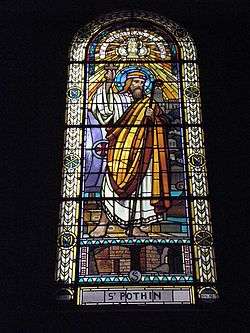Saint Pothinus
| Saint Pothinus | |
|---|---|
|
Stained glass window depicting Pothinus. Église Saint-Pothin, Lyon. | |
| Martyr and Bishop of Lyon | |
| Born | ~87 AD |
| Died |
~177 AD Lyon, Gaul |
| Venerated in | Roman Catholic Church |
| Canonized | Pre-congregation |
| Feast | 2 June |
Saint Pothinus (French: Saint Pothin) is first mentioned in a letter attributed to Irenaeus of Lyon. The letter was sent from the Christian communities of Lyon and Vienne to the Roman province of Asia.
History
According to Alban Butler, by 177, a large number of the Christians in the area of Vienne and Lyons were Greeks from Asia. A violent persecution was there against them while Pothinus was bishop of Lyons, and Irenæus, who had been sent there by Polycarp out of Asia, was a priest of that city.[1]

Irenaeus, in attempting to assert his own authority as bishop of Lyon, claims that Pothinus had been his predecessor in the position, and the first holder of that office; in Irenaeus' account, Pothinus was born around the year 87, and died at the age of ninety, in about 177 AD.
According to the letter, Pothinus was martyred along with Alexander, Attalus, Espagathus, Maturus, and Sanctius, during persecutions by Marcus Aurelius, a Roman Emperor known for his great tolerance of faiths other than Christianity. Pothinus and several companions were seized by a mob and taken to the magistrate; Pothinus is believed to have died from the abuse he suffered in prison, while the others were killed by wild beasts in the local amphitheater.
The similarity of the name Pothinus and the Old French verb foutre (roughly equivalent to the Modern English term fuck) lead to syncretic amalgamation of Pothinus and Priapus,[2] under the assimilated name Saint Foutin.
See also
References
- ↑ Butler, Alban. "St. Pothinus, Bishop, Sanctus, Attalus, Blandina, &c., Martyrs of Lyons", Lives of the Saints, Vol.VI, 1866
- ↑ Elizabeth A. Chesney, The Rabelais Encyclopedia, article on Saints, Imaginary
External links
| Catholic Church titles | ||
|---|---|---|
| New title | Bishop of Lyon 2nd century |
Succeeded by Irenaeus |
